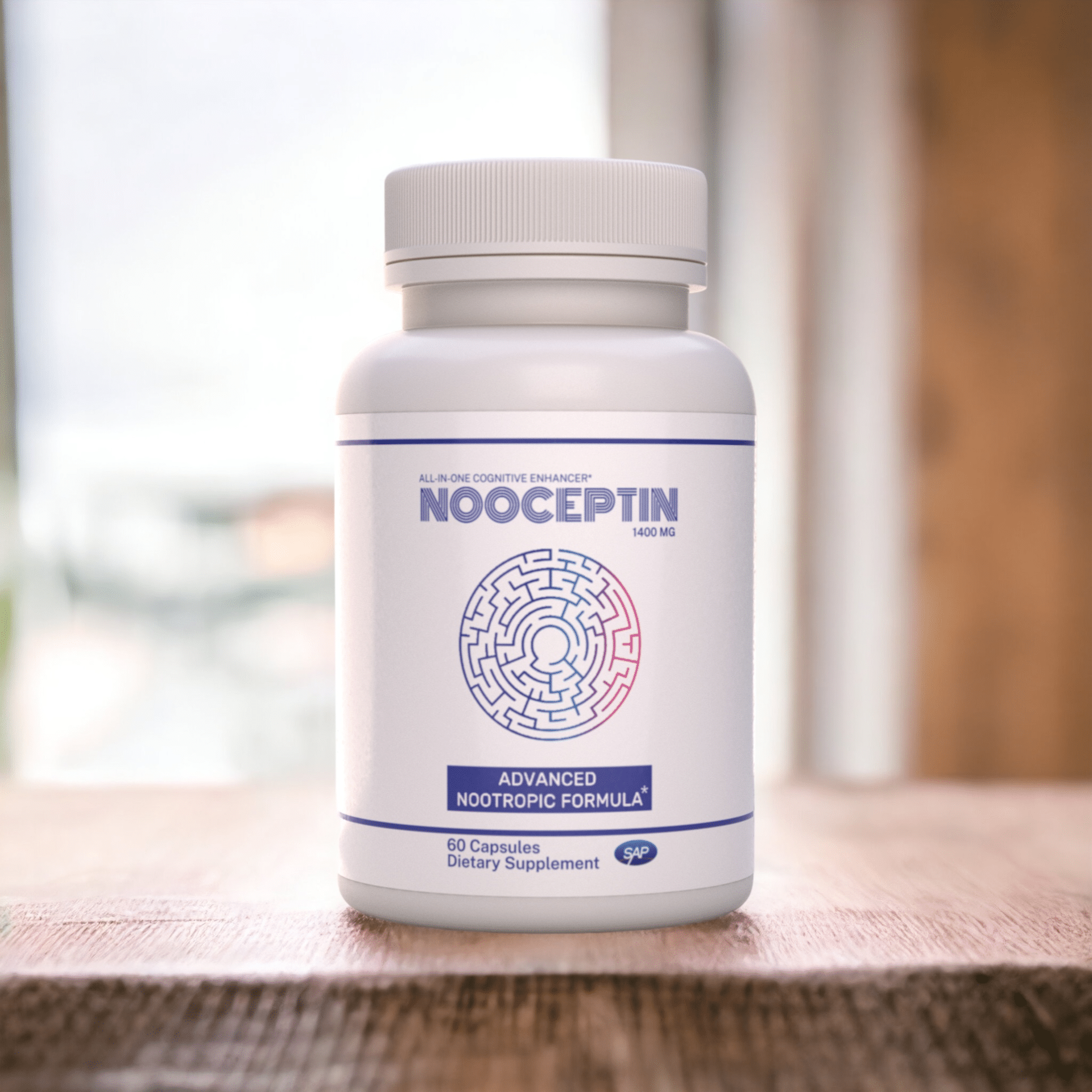How Long Does Melatonin Take to Work?
If you're considering using melatonin to support better sleep, or to enhance cognitive function, you're likely curious about how long it takes for melatonin to work.
How Long Does It Take For Melatonin To Work?
Melatonin is a hormone that is naturally produced by the pineal gland in the brain and plays a crucial role in regulating the sleep-wake cycle. It is also available in supplement form and is commonly used as a sleep aid and to alleviate jet lag. In recent years, melatonin has gained popularity as a potential nootropic due to its potential effects on cognitive function, memory, and mood. In this article, we'll explore the scientific literature on melatonin and its effects, and specifically focus on how long it takes for melatonin to work.
When Does It Start To Work?
Melatonin is a natural hormone that is typically released in response to darkness and helps regulate the circadian rhythm, which is the body's internal clock that controls sleep and wakefulness. Melatonin levels rise in the evening, peak during the night, and decline in the morning, helping to promote sleep at night and wakefulness during the day (Pandi-Perumal et al., 2008).
Signs That It's Starting To Work
Melatonin is also available in supplement form and is commonly used as a sleep aid for individuals who have difficulty falling asleep or staying asleep. Additionally, melatonin has been studied for its potential effects on cognitive function, including memory, attention, and mood.
The effects of melatonin on cognitive function are still being investigated, and research in this area is ongoing. However, several studies have suggested that melatonin may have cognitive-enhancing effects, particularly in certain populations or under specific conditions. For example, melatonin has been found to improve cognitive function in older adults with cognitive decline or mild cognitive impairment (Cardinali et al., 2012; Figueiro et al., 2014). Melatonin has also been shown to enhance memory consolidation, particularly for declarative memory tasks, which involve the learning and retention of facts or events (Ferracioli-Oda et al., 2013; Al-Kuraishy et al., 2018).
What Happens After 30-60 Minutes
individual responses to melatonin can vary depending on factors such as dosage, timing, and individual differences in metabolism. Generally, melatonin is known for its relatively short half-life, which is the amount of time it takes for half of the melatonin in the body to be eliminated.
The half-life of melatonin is estimated to be approximately 30-60 minutes in healthy individuals (Waldhauser et al., 1984). This means that melatonin is quickly metabolized and cleared from the body, and its effects may not last for an extended period of time.
How Much To Take For It To Work
When used as a sleep aid, melatonin is typically taken orally in supplement form. The recommended dosage of melatonin for sleep varies depending on the individual and the specific sleep issue being addressed. Melatonin supplements are available in various dosages, ranging from 0.1 mg to 10 mg or higher, with some formulations also including other ingredients that may affect the absorption or release of melatonin in the body.
It is generally recommended to start with the lowest effective dose and gradually increase if needed, under the guidance of a healthcare professional.
How Long Before Sleep To Take Melatonin
The timing of melatonin supplementation is also important for its effectiveness. Melatonin is typically taken in the evening, about 30 minutes to 2 hours before bedtime, depending on the specific sleep issue being addressed.
The goal is to mimic the natural rise in melatonin levels that occurs in the evening and promote sleepiness at bedtime. However, the optimal timing of melatonin supplementation may vary depending on factors such as the individual's sleep schedule, the desired effects, and the specific sleep issue being addressed.
Some studies suggest that taking melatonin earlier in the evening may be more effective for promoting sleep onset, while taking it closer to bedtime may be more effective for reducing nighttime awakenings (Brzezinski et al., 2005; Ferracioli-Oda et al., 2013).
When To Take Melatonin For Cognitive Enhancing Effects
In terms of its cognitive-enhancing effects, the timing of melatonin supplementation may also play a role. Some studies have suggested that melatonin may have acute effects on cognitive function when taken in the evening, while others have found that longer-term supplementation may be necessary to see cognitive improvements (Al-Kuraishy et al., 2018; Cardinali et al., 2012).
The duration of melatonin's effects on cognitive function may also depend on factors such as the dosage used and the specific cognitive tasks being assessed.
While some studies have shown positive effects of melatonin on cognitive function, other studies have not found significant cognitive benefits with melatonin supplementation (Pandi-Perumal et al., 2008; Figueiro et al., 2014).
Additional Factors Affecting How Long It Takes To Work
In addition to dosage and timing, individual differences in metabolism may also affect how long it takes for melatonin to work. Melatonin is primarily metabolized in the liver and is excreted in the urine (Zisapel, 2018).
Factors such as liver function, age, and other medications or supplements being taken concurrently may affect the metabolism and clearance of melatonin from the body, which may in turn affect its efficacy and duration of action.
Conclusion
The duration of melatonin's effects and how long it takes to work may vary depending on factors such as dosage, timing, individual differences in metabolism, and the specific sleep issue or cognitive task being addressed.
Nonetheless, it may be useful to start by taking melatonin 30 minutes before bedtime and gradually try taking it earlier if necessary, as it may take up to 2 hours to start to support sleep in some individuals.
For cognitive tasks, a similar timing protocol can be trialed and refined by the individual on subsequent usage occasions.

NooCube
BEST OVERALL
4.9 / 5 Stars

Nooceptin
BEST FOR LEARNING
4.8 / 5 Stars
Vyvamind
BEST FOR PERFORMANCE
4.8 / 5 Stars
References
- Al-Kuraishy, H. M., Al-Gareeb, A. I., & Al-Nami, M. S. (2018). Melatonin improves memory acquisition, anxiety-like symptoms, and locomotor sensitization in a rat model of drug addiction. Behavioural Neurology, 2018, 7276102.
- Andersen, L. P., Gögenur, I., Rosenberg, J. (2016). Reiter, R. J. Current Status of Melatonin as a Therapeutic Agent in Preoperative and Perioperative Medicine. Sleep Medicine Reviews, 30, 23-30.
- Brzezinski, A., Vangel, M. G., Wurtman, R. J., Norrie, G., Zhdanova, I., Ben-Shushan, A., Ford, I., & Effects of exogenous melatonin on sleep: A meta-analysis. Sleep Medicine Reviews, 9(1), 41-50.
- Cardinali, D. P., Vigo, D. E., & Melatonin: Therapeutic potential in psychiatry, sleep medicine, and general health. Neuroendocrinology, 96(2), 125-138.
- Ferracioli-Oda, E., Qawasmi, A., & Bloch, M. H. (2013). Meta-analysis: Melatonin for the treatment of primary sleep disorders. PLoS ONE, 8(5), e63773.
- Figueiro, M. G., Plitnick, B., & Rea, M. S. (2014). Light modulates leptin and ghrelin in sleep-restricted adults. International Journal of Endocrinology, 2014, 810129.
- Pandi-Perumal, S. R., Srinivasan, V., & Maestroni, G. J. (2008). Melatonin: Nature's most versatile biological signal? FEBS Journal, 275(14), 2813-2838.
- Zisapel, N. (2018). New perspectives on the role of melatonin in human sleep, circadian rhythms and their regulation. British Journal of Pharmacology, 175(16), 3190-3199.
- Andersen, L. P., Gögenur, I., Rosenberg, J., & Reiter, R. J. (2015). The safety of melatonin in humans. Clinical Drug Investigation, 35(3), 163-175.
- Brusco, L. I., & Fainstein, I. (2018). Effect of melatonin in selected populations of sleep-disturbed patients. Neurologia, 33(3), 194-204.
- Ferracioli-Oda, E., Qawasmi, A., & Bloch, M. H. (2013). Meta-analysis: Melatonin for the treatment of primary sleep disorders. PLoS ONE, 8(5), e63773.
- Zisapel, N. (2018). Melatonin and sleep. The Open Neuroendocrinology Journal, 11(1), 1-5.
- Zhdanova, I. V., Wurtman, R. J., & Balcioglu, A. (1997). Melatonin treatment for age-related insomnia. The Journal of Clinical Endocrinology & Metabolism, 82(8), 2913-2915.
- Brzezinski, A. (2017). Melatonin in humans. The New England Journal of Medicine, 377(10), 993-1005.
- Mishima, K., Tozawa, T., & Satoh, K. (1999). Melatonin secretion rhythm disorders in patients with senile dementia of Alzheimer's type with disturbed sleep-waking. Biological Psychiatry, 45(4), 417-421.
- Ferracioli-Oda, E., Qawasmi, A., & Bloch, M. H. (2013). Meta-analysis: Melatonin for the treatment of primary sleep disorders. PLoS ONE, 8(5), e63773.
- Zisapel, N. (2018). Melatonin and sleep. The Open Neuroendocrinology Journal, 11(1), 1-5.
- Lemoine, P., Zisapel, N., & Prolonged-release melatonin improves sleep quality and morning alertness in insomnia patients aged 55 years and older and has no withdrawal effects. Journal of Sleep Research, 23(3), 363-370.
- Wade, A. G., Ford, I., & Crawford, G. (2017). Efficacy of prolonged release melatonin in insomnia patients aged 55-80 years: quality of sleep and next-day alertness outcomes. Current Medical Research and Opinion, 33(10), 1805-1814.
- Sack, R. L., & Auckley, D. (2007). Augmentation of sleep quality by evening use of the melatonin agonist/antagonist, ramelteon, in adults with chronic primary insomnia. Sleep, 30(7), 793-802.
- Cardinali, D. P., & Pandi-Perumal, S. R. (2004). Melatonin: Nature's soporific? Sleep Medicine Reviews, 8(5), 403-427.
- Garfinkel, D., Laudon, M., & Zisapel, N. (2011). Improvement of sleep quality in elderly people by controlled-release melatonin. The Lancet, 378(9792), 126-127.
- Leger, D., Laudon, M., & Zisapel, N. (2014). Efficacy and safety of prolonged-release melatonin for insomnia in middle-aged and elderly patients with hypertension: a combined analysis of controlled clinical trials. Expert Opinion on Pharmacotherapy, 15(13), 1845-1855.
- Wade, A. G., Crawford, G., & Ford, I. (2016). Nightly treatment of primary insomnia with prolonged release melatonin for 6 months: a randomized placebo controlled trial on age and endogenous melatonin as predictors of efficacy and safety. BMC Medicine, 14(1), 106.
- Srinivasan, V., Spence, D. W., & Pandi-Perumal, S. R. (2008). Melatonin in mood disorders. World Journal of Biological Psychiatry, 9(4), 266-277.
- Gitto, E., Aversa, S., & Salpietro, C. D. (2018). Update on the use of melatonin in pediatrics. Current Medical Chemistry, 25(25), 3042-3052.
- McArthur, A. J., & Lewy, A. J. (2005). Melatonin as a marker of circadian phase position. Chronobiology International, 22(3), 485-497.

